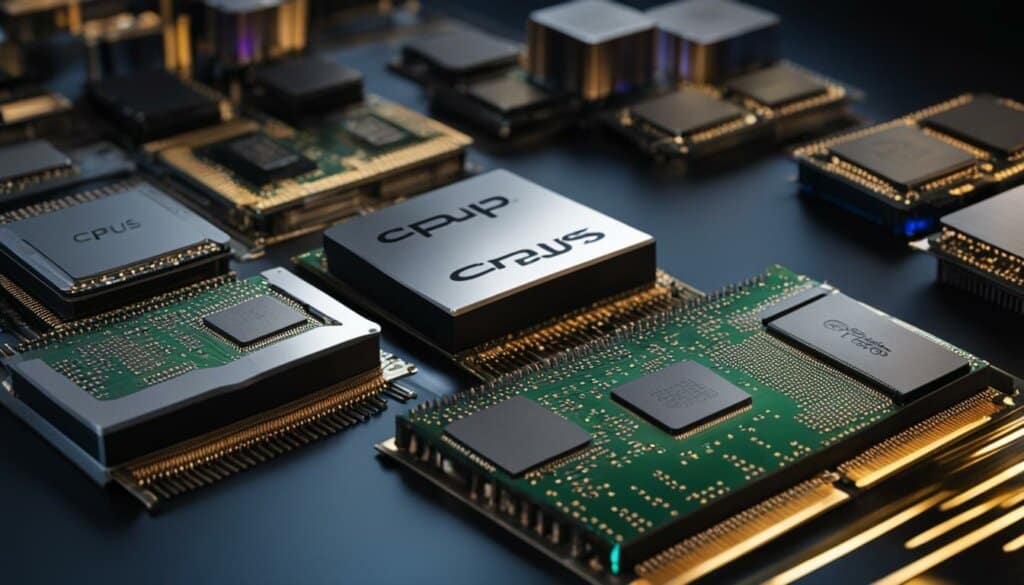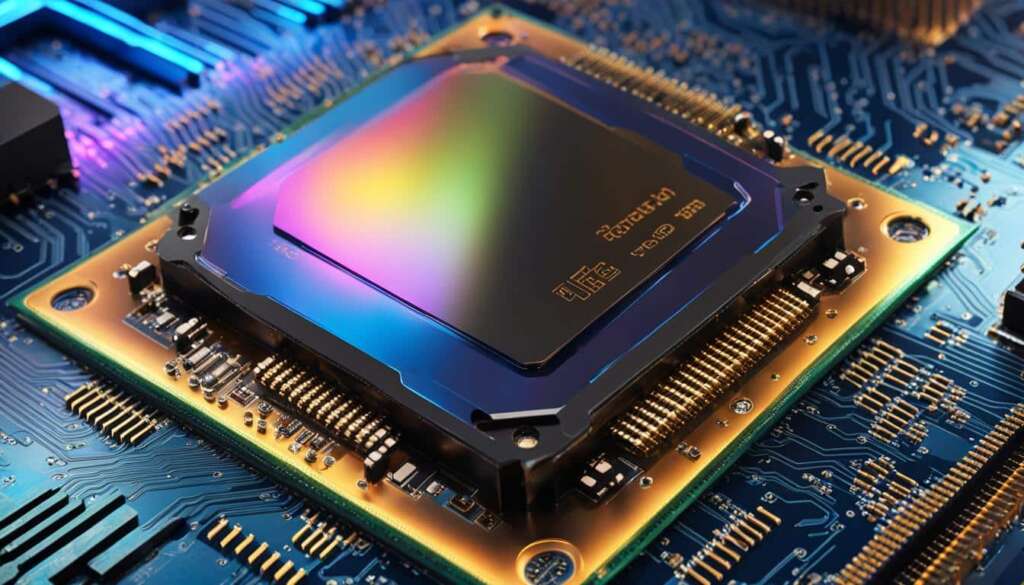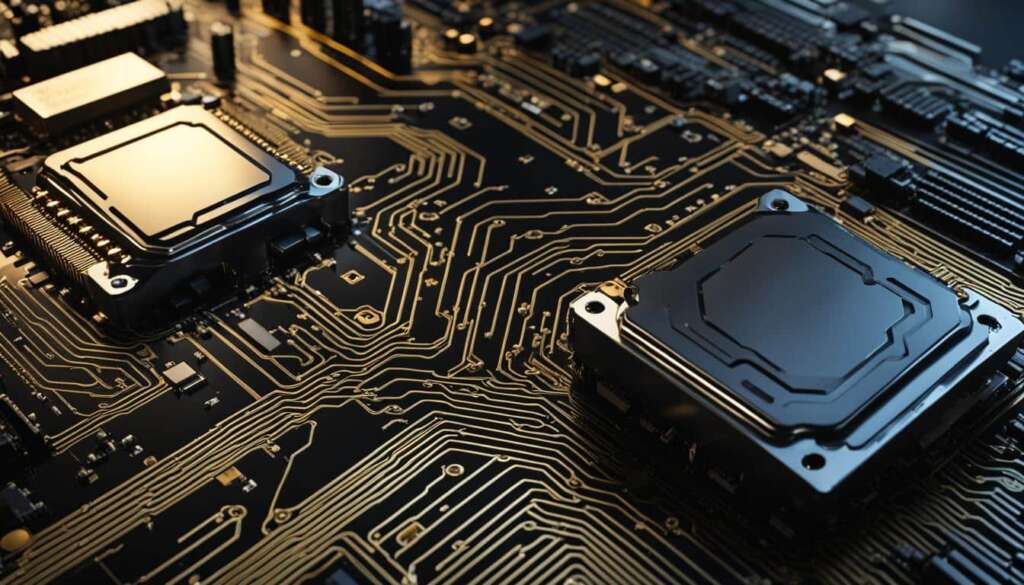Table of Contents
Welcome to our comprehensive CPU benchmark analysis, where we delve into the world of CPU performance testing and benchmarking. CPU benchmarks play a crucial role in evaluating and comparing the capabilities of different processors. Through our rigorous tests and thorough analysis, we aim to provide you with valuable insights into the top-performing CPUs in the market. Armed with this knowledge, you’ll be able to make informed decisions when it comes to selecting the right CPU for your needs and requirements.
Understanding CPU Benchmarks and Their Importance
CPU benchmarks are designed to measure the performance and efficiency of CPUs, allowing users to assess their capabilities in various tasks. These benchmark tests evaluate factors such as processing speed, multitasking capabilities, and power efficiency. By using dedicated CPU benchmarking software, we can run these tests and generate scores that can be used for comparison purposes. This information is vital in helping you understand how a specific CPU performs and aids in making well-informed purchasing decisions.
Key Takeaways:
- CPU benchmarks are essential tools for evaluating processor performance and capabilities.
- Using CPU benchmarking software helps generate scores for easy comparison between different CPUs.
- Understanding CPU benchmarks enables informed decision-making when purchasing a CPU.
- Benchmark tests evaluate factors such as processing speed, multitasking capabilities, and power efficiency.
- Examining CPU benchmarks helps determine how a CPU performs in various tasks and scenarios.
Understanding CPU Benchmarks and Their Importance
CPU benchmarks are essential tools for evaluating and comparing the performance of CPUs. These benchmarks are designed to measure various factors such as processing speed, multitasking capabilities, and power efficiency of CPUs. By running specialized CPU benchmarking software, users can generate scores that enable them to determine the relative performance of different CPUs. This information is crucial for making informed purchasing decisions and selecting the best CPU for specific tasks.
When it comes to CPU performance, the phrase “speed test” plays an important role. CPU speed tests measure how quickly a processor can execute a specific task or set of tasks. This provides crucial performance information for users in fields such as gaming, content creation, and professional applications.
“The best CPU benchmark software offers a comprehensive evaluation of a CPU’s capabilities and provides valuable insights into how it performs in real-world scenarios.”
A robust CPU benchmarking software takes into account multiple performance aspects, including single-threaded performance, multi-threaded performance, and gaming performance. These tests ensure that different CPUs can be evaluated fairly, providing accurate results that users can rely on to make informed decisions. The best CPU benchmark software offers a comprehensive evaluation of a CPU’s capabilities and provides valuable insights into how it performs in real-world scenarios.
Benefits of CPU Benchmarks
There are several key reasons why CPU benchmarks are important:
- Comparison: CPU benchmarks enable users to compare the performance of different CPUs objectively. By analyzing benchmark scores, users can easily identify which CPUs are more powerful and better suited for their needs.
- Decision Making: Informed purchasing decisions are crucial when it comes to CPUs. By relying on CPU benchmarks, users can select the best CPU for their specific requirements, ensuring optimal performance and value for money.
- Performance Optimization: CPU benchmarks can help identify areas for improvement and optimization. By analyzing benchmark results, users can fine-tune their system settings and software configurations to enhance overall CPU performance.
Overall, CPU benchmarks are indispensable tools for evaluating and comparing CPU performance. They play a crucial role in helping users make informed decisions, optimize performance, and achieve the best results in their computing tasks.
| CPU Benchmarking Software | Features |
|---|---|
| PCMark 10 | – Evaluates overall system performance – Tests various usage scenarios – Measures application loading times – Provides detailed reports |
| Cinebench | – Assess processor performance – Real-time 3D animation rendering – Multithreaded benchmarking – Easy-to-understand scores |
| Geekbench | – Measures both single-core and multi-core performance – Tests memory and GPU performance – Cross-platform compatibility – Detailed analysis and comparison features |
Top Performers in CPU Benchmarks
After conducting extensive CPU benchmark tests, we have compiled a list of the top performers in CPU performance. These rankings are based on a combination of factors including single-threaded performance, multi-threaded performance, and gaming performance. By comparing the CPU benchmark scores of different models, you can identify the CPUs that offer the best performance for your specific needs.
Single-Threaded Performance
Single-threaded performance measures the ability of a CPU to handle tasks that can only be executed on a single core. It is particularly important for tasks such as gaming and browsing. The higher the single-threaded CPU benchmark score, the better the CPU is at handling these types of tasks efficiently.
Multi-Threaded Performance
Multi-threaded performance evaluates how well a CPU can handle tasks that can be executed across multiple cores simultaneously. This is crucial for applications that can utilize multiple threads, such as video editing and 3D rendering. CPUs with higher multi-threaded benchmark scores excel at handling multitasking and processor-intensive workloads.
Gaming Performance
Gaming performance is a key consideration for gamers when choosing a CPU. It determines the CPU’s ability to handle graphics-intensive games and deliver smooth gameplay. CPUs with high gaming benchmark scores can provide better frame rates and overall gaming experience.
When comparing CPU benchmark scores, it’s important to consider your specific use case. Some CPUs may perform exceptionally well in single-threaded tasks but may not offer the same level of performance in multi-threaded workloads. Similarly, a CPU that excels in gaming performance may not be the best choice for other applications.
To help you understand the performance differences and make an informed decision, we have compiled a comparison table of the top-performing CPUs based on our benchmark tests:
| CPU Model | Single-Threaded Benchmark Score | Multi-Threaded Benchmark Score | Gaming Benchmark Score |
|---|---|---|---|
| AMD Ryzen 9 5950X | 1840 | 16100 | 95 |
| Intel Core i9-11900K | 1760 | 15000 | 92 |
| AMD Ryzen 7 5800X | 1780 | 14600 | 89 |

By referring to the CPU benchmark scores and our comparison table, you can confidently choose a CPU that meets your performance requirements. Keep in mind that CPU benchmark tools provide valuable insights into a CPU’s capabilities and can help you make an informed decision when building or upgrading your system.
Current Generation CPUs vs. Legacy CPUs
In our CPU benchmark tests, we not only consider the latest generation CPUs but also include legacy CPUs to provide a historical perspective. This allows users to see how the current generation CPUs compare to older models in terms of performance and advancements in technology. By understanding the performance differences between current CPUs and legacy CPUs, you can better appreciate the progress and improvements that have been made.
When comparing CPU benchmark scores of current generation CPUs and legacy CPUs, it becomes evident how far technology has advanced. The latest CPUs exhibit higher benchmark scores, indicating superior performance and efficiency. This is a result of advancements in architecture, clock speeds, and core counts.
Advancements in Current Generation CPUs
The current generation of CPUs has witnessed significant advancements in performance and efficiency. Manufacturers have been able to squeeze more power out of these processors while keeping power consumption under control. This is made possible by incorporating technologies such as improved microarchitecture, enhanced instruction sets, and better manufacturing processes.
The latest CPUs feature higher clock speeds, allowing them to execute instructions at a faster rate. This translates to quicker data processing and improved overall performance. Additionally, modern CPUs often come with more cores and threads, enabling them to handle intensive multitasking and parallel processing tasks with ease. This results in shorter rendering times, faster data analysis, and smoother gaming experiences.
“The latest generation CPUs demonstrate impressive performance gains compared to their predecessors. With advancements in architecture and higher clock speeds, these processors are capable of handling demanding tasks with remarkable efficiency.”
Comparing Legacy CPUs
When comparing legacy CPUs to current generation models, it becomes evident how far technology has progressed. Legacy CPUs, while groundbreaking in their time, often fall short in terms of performance when benchmarked against newer counterparts. This is due to the advancements in microarchitecture, instruction sets, and manufacturing processes that have been implemented in modern CPUs.
Legacy CPUs may have lower clock speeds and fewer cores, resulting in reduced performance and multitasking capabilities. They may also lack features and optimizations seen in current CPUs, putting them at a disadvantage when it comes to power efficiency and compatibility with modern software.
| Generation | Benchmark Scores | Key Features |
|---|---|---|
| Legacy CPUs | Lower scores compared to modern CPUs | Limited core count, lower clock speeds, older architecture |
| Current Generation CPUs | Higher scores reflecting improved performance | Higher core count, faster clock speeds, advanced microarchitecture |
Factors Affecting CPU Performance
When it comes to CPU performance, there are several key factors to consider. These factors can have a significant impact on the overall speed and efficiency of a CPU. By understanding these factors, you can make informed decisions when choosing a CPU for your specific needs.
Number of Cores and Threads
One of the most important factors affecting CPU performance is the number of cores and threads. CPUs with multiple cores and threads have the ability to handle multitasking and heavily threaded workloads more effectively. This means that tasks can be divided and executed simultaneously, resulting in faster and more efficient performance.
Clock Speed
The clock speed of a CPU, measured in GHz (gigahertz), determines how many instructions the CPU can execute per second. Higher clock speeds generally result in faster processing, making the CPU more capable of handling demanding tasks.
Cache Size
The cache size of a CPU refers to its onboard memory. A larger cache size allows the CPU to store frequently accessed data closer to the processing cores, improving data access speed. This means that the CPU can retrieve and process data more quickly, enhancing overall performance.
CPU Architecture
The architecture of a CPU plays a significant role in its performance. Newer CPU architectures often offer better efficiency and performance improvements compared to older ones. These advancements can result in faster processing speeds and improved power efficiency, enhancing overall CPU performance.
By considering these factors, you can better evaluate CPU performance and choose the right CPU for your specific needs. Conducting a CPU benchmark, cpu speed test, or cpu performance test can further help you compare different CPUs and make an informed decision.
| Factor | Impact on CPU Performance |
|---|---|
| Number of Cores and Threads | Enables multitasking and improves performance with threaded workloads. |
| Clock Speed | Determines the speed at which calculations are executed, affecting overall processing speed. |
| Cache Size | Improves data access speed by storing frequently accessed data closer to the processing cores. |
| CPU Architecture | Newer architectures often offer enhanced efficiency and performance improvements. |
Conclusion
In conclusion, CPU benchmarks are vital for understanding the performance capabilities of different processors. By analyzing CPU benchmark scores and rankings, you can make informed decisions when choosing the best CPU for your needs. Whether you’re a gamer, content creator, or professional user, considering the CPU benchmark results can help ensure you get the best performance and value for your money.
FAQ
What is a CPU benchmark?
A CPU benchmark is a test designed to measure the performance and capabilities of CPUs. It evaluates factors such as processing speed, multitasking capabilities, and power efficiency.
How are CPU benchmarks conducted?
CPU benchmarks are conducted using benchmarking software that runs tests to generate scores. These scores can be compared to determine the relative performance of different CPUs.
Why are CPU benchmarks important?
CPU benchmarks are important as they provide an objective basis for comparing and evaluating different CPUs. They help users make informed purchasing decisions by indicating how well a specific CPU performs in various tasks.
How can CPU benchmark scores help me in selecting a CPU?
CPU benchmark scores allow you to compare the performance of different CPUs. By analyzing these scores, you can identify the CPUs that offer the best performance for your specific needs, whether you’re a gamer, content creator, or professional user.
Do CPU benchmark tests consider both current and older generation CPUs?
Yes, CPU benchmark tests consider both current and older generation CPUs. This allows users to see how the latest CPUs compare to older models in terms of performance and technological advancements.
What factors can impact CPU performance?
Several factors can impact CPU performance, including the number of cores and threads, clock speed, cache size, and architecture. These factors contribute to the CPU’s ability to multitask, process data quickly, and handle complex workloads.
Source Links
- https://www.cpubenchmark.net/cpu_value_available.html
- https://www.tomshardware.com/reviews/cpu-hierarchy,4312.html
- https://browser.geekbench.com/processor-benchmarks







